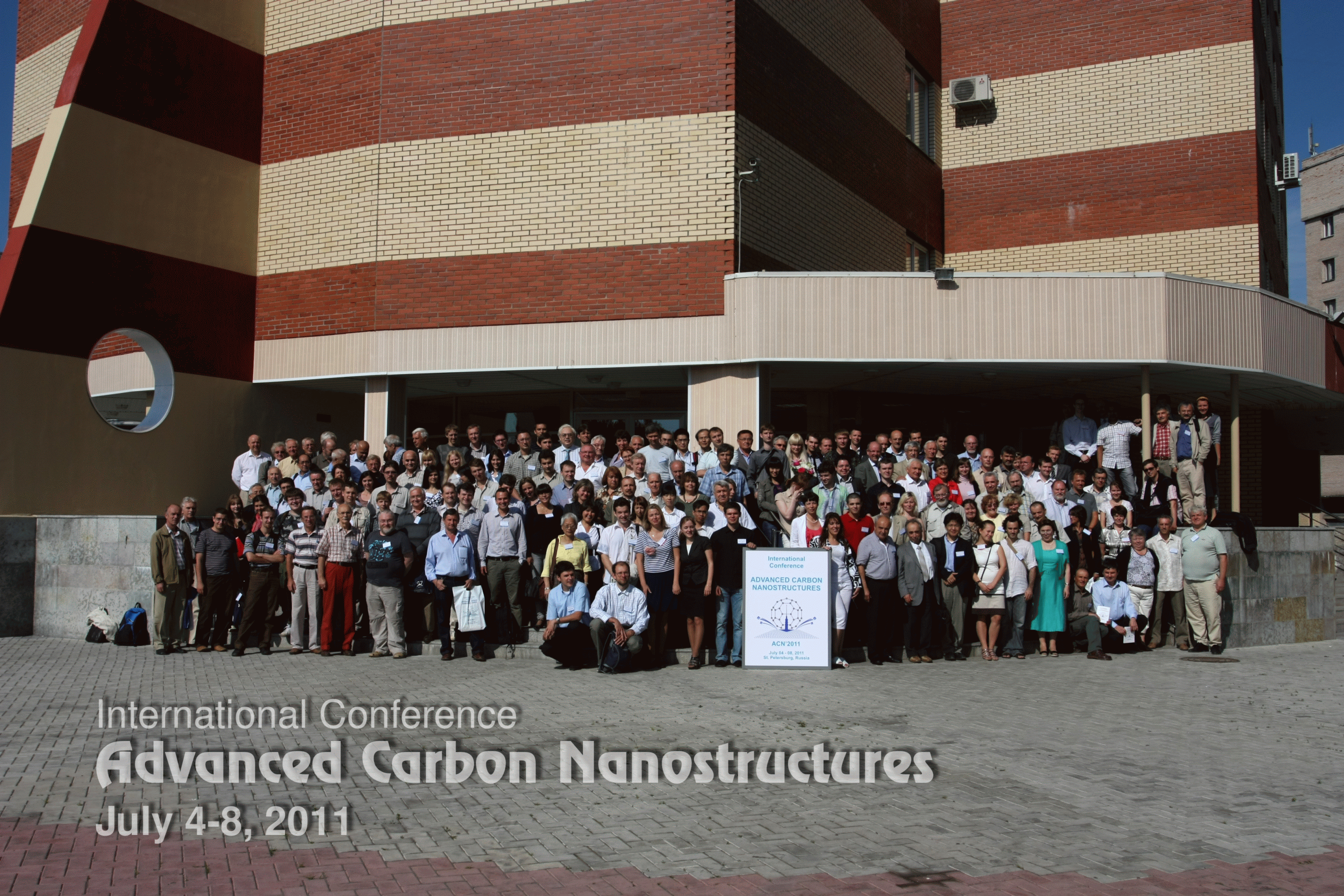
Information
The International conference "Advanced Carbon
Nanostructures" (ACN) integrates the 10th
Biennial International Workshops "Fullerenes
and Atomic Clusters" and the 4th International
Symposiums "Detonation Nanodiamonds: Technology,
Properties and Applications".
This integration of two international conferences
is a result of discussion among members of International
Advisory and the Program Committees of the conferences.
In fact, the new carbon nanostructures - fullerenes,
carbon nanotubes, carbide derived carbon, onions,
nanographite and nanodiamonds and the most popular
now graphene are members of one nanocarbon family.
There are general approaches to technology of
their production and the methods of characterizations.
The most important feature is that knowledge of
physical and chemical properties of one nanostructure
of the nanocarbon family helps at research of
other carbon nanostructure. What is more, some
competition in applications of different nanocarbons
gives a chance to choose the best structure for
the specific application. For example, to solve
whether carbide derived carbon or carbon nanotubes
could be the best for supercapacitors, or to solve
whether nanodiamond films or nanotubes could be
the best for field electron emitter.
Indeed, unique possibility of carbon atoms to
form sp, sp2 and sp3 bonds provides the basis
of the diversity on carbon nanostructures and
attracts attention of nanocarbon community to
the joint conference.
Both conferences mentioned above were arranged
by St Petersburg research centers and Universities
and held in St Petersburg, and this helps to arrange
the joint conference.
It is important to remind shortly a history of
the previous conferences.
The Biennial International Workshops "Fullerenes
and Atomic Clusters" (IWFAC) started in St
Petersburg in October 1993. Since that time, the
IWFAC has become one of the most representative
world meetings in the field of fullerenes and
carbon nanotubes. It is important to note the
participation in the IWFAC'93-09 of the founders
of this science and of the scientists who determine
main directions in this field.
The first International Symposium "Detonation
Nanodiamond. Technology, Properties and Applications"
(NanoDiamond) was held in St Petersburg in July,
2003, then NATO Advanced Research Workshop and
the Symposium were arranged in 2004, 2006, 2008.
The lists of invited speakers of the past IWFAC's
and the Symposiums included well-known members
of the nanocarbon world:
H.Kroto (UK, Univ. of Sussex), M. Dresselhaus
(USA, MIT), M. Endo (Japan, Shinshu University),
D.R.Huffman (USA, Univ. of Arizona), S.Iijima
(Japan, NEC Corporation), W.Kraetschmer
(Germany, Max-Plank-Institute), E.Osawa
(Japan, Nanocarbon Research Institute), M.
Prato (Italy, University of Trieste), H.
Shinohara (Japan, Nagoya University), R.Taylor
(UK, Univ. of Sussex), F. Wudl (USA, UCLA),
T. Enoki (Japan, Tokyo Institute of Technology),
D. Gruen (USA, Argonne National Laboratory),
O. Williams (Belgium, Hasselt University),
R. Carlson (USA, Molecular Diamond Technologies,
Chevron Technology Ventures), J.L. Davidson
(USA, Vanderbilt University), J. Wrachtrup
(Germany, Stuttgart University), D. Ho
(USA, Northwestern University), C.E. Nebel
(Germany, Fraunhofer Institute) and others top-level
scientists.
Ministry of Education and Science of the Russian
Federation and Russian Foundation for Basic Research
are permanent sponsors of the IWFACs and the NanoDiamonds.
Besides the Russian Academy of Sciences, International
Science and Technological Center, Frontier Carbon
Corporation (Japan), Marcel Dekker, Inc (USA)
and Rusnano as well as NT-MTD sponsored the conferences.
The Organizers would like to provide ACN'2011
as an international forum for the exchange of
information on the latest progress in carbon nanostructures.
The scientific program consists of both oral and
poster presentations as well as lectures by invited
keynote speakers who survey areas of major interest.
General topics include synthesis and technology,
physical properties, chemistry of carbon nanostructures
as well as their main applications for industry,
biology and medicine.
Progress in modern nanotechnologies requires development
of new, and refinement of already available methods
of diagnostics. It is the reason to arrange the
conference school for young scientists "Diagnostics
of Carbon Nanostructures" which will be held
in the course of the ACN'2011 on July 3, 2011.
Based on experience of the previous conferences,
the number of the participants of the ACN'2011
will be about 300, including 200 from Russia and
100 from European countries, Japan, USA, and other
countries.
The Proceedings of the ACN'2011 will be published
as a special issue of "Fullerenes, Nanotubes,
and Carbon Nanostructures" in 2012.
In spite of their short history, the conferences
have their own traditions.
The science on nanocarbons is radically interdisciplinary
in nature. Physics, chemistry, mathematics, astronomy,
and medicine represent an incomplete list of fields
dealing with the research of fullerenes, nanotubes,
nanodiamond and graphene. Indeed, fullerene science
opens ways for constructing new materials with
predetermined properties on the atomic scale and
actually creates the fundamentals of material
science in the XXI century.
Therefore discussion of nanocarbon applications
is one of the traditions of the conferences. The
Sponsors and the Organizing Committee have been
trying to help and promote young participants,
and it is also one of the traditions of the conferences.
The Program committee has arranged a special award
for young scientists for best presentation.
In conclusion, some words about our Social Program.
St Petersburg is both a scientific and a cultural
center. It is a beautiful city designed and built
by Russian and Western architects. It is often
called "the Venice of the North". As
usual along with the Scientific Session, a Social
Program is planned. The organizers will arrange
a sightseeing program to introduce the guests
and accompanying persons to St Petersburg. The
ACN'2011 will be held in the period of "white"
nights, when the city looks especially beautiful.
We are looking forward to seeing all of you in
the July 2011 during white nights in St Petersburg.
The
Organizers are pleased to welcome members of the
world nanocarbon community to St Petersburg.
|